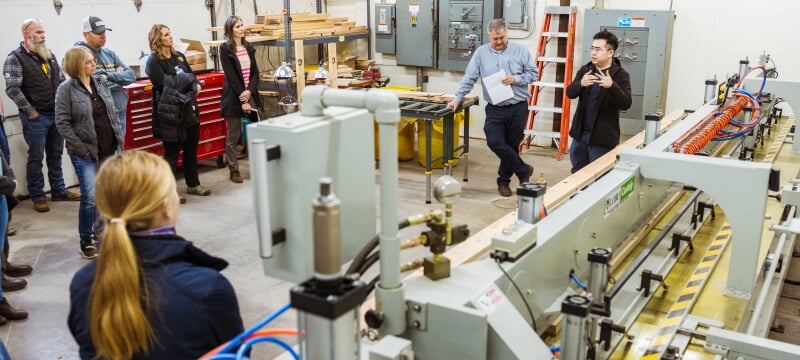Program Regulations
The program of study for each student will be planned and supervised in accordance with existing University and School policies. The student's advisory committee (which includes the student's advisor) must ensure that each Master of Forestry candidate's coursework meets the standards of a master's program. To become a Michigan Tech forester and to achieve Society of American Foresters accreditation specific skills are needed. Therefore, the Master of Forestry has completely specified coursework.
Students must file the necessary forms with the Graduate School to document their progress.
Degree Completion Timeline
The degree completion timeline shows a list of items needed to complete the degree.
Students can view their Degree Progress Checklist for a list of items that are complete or pending for each degree they are pursuing. See the Graduate School's online tutorial for help with their Degree Progress Checklist.
Residency Requirements
The residency requirements are satisfied when both of the following conditions are met:
- A minimum of two-thirds of the required non-research coursework credits required for the degree must be taken through Michigan Tech. PhD students must take at least 20 credits beyond the master's or 50 credits beyond the bachelor's through Michigan Tech.
- Research credits used to satisfy degree requirements must be taken through Michigan Tech and must be supervised by a member of Michigan Tech's graduate faculty.
Courses that meet the "through Michigan Tech" requirement are defined as courses listed in the Michigan Tech course catalog and taught by Michigan Tech faculty.
Credit Requirements
Minimum Requirements
Programs may have stricter requirements than listed here and may require more than the minimum numbers of credits listed here.
- Thirty credits beyond the bachelor’s degree are required for a master’s degree.
- Thirty credits beyond the master’s degree are required for a PhD.
- Maximum of 12 credits may be at the 3000 or 4000 level (with program approval).
- MEng allows a maximum of 14 credits at the 3000 or 4000 level.
- One-third of the non-research credits may be transfer credits as long as they were not applied toward another degree.
- Research credits are the only non-graded classes that may be counted toward a degree.
- All credits must meet the Scholastic Standards of the Graduate School in order to be counted toward the credit requirements.
Unallowable Credits
- Courses numbered below 3000.
- Audited courses.
- Continuous enrollment courses (ex: UN5951, UN5953).
- Non-research courses taken for pass/fail courses.
- Credits applied toward another degree (see exceptions below).
- Undergraduate credits (see exceptions below).
Special Exceptions
- A portion of the non-research/non-practicum credits earned at Michigan Tech may be reused to earn an additional master's degree in accordance with Graduate School policy.
- Students in an accelerated master’s program may apply up to nine approved credits earned while an undergraduate toward both their bachelor’s and master’s degrees in accordance with University policy. Each program may set limits on the type and number of credits.
Academic Progress
Students must be in good standing to earn a graduate degree.
Time Limits
All work must be completed within the specified time frame starting from the first enrollment in the degree program or earliest course listed on the degree schedule, whichever is earliest.
- Master’s degree must be completed within five (5) calendar years.
- PhD must be completed within eight (8) calendar years.
Requests for extension must be made by the advisor to the Graduate School.
Responsible Conduct for Research Training
The University requires that all students complete basic responsible conduct for research training. Students completing a dissertation, thesis, or report will also complete advanced responsible conduct for research training. See our Responsible Conduct of Research Training page for details on how to complete the training.
Advisor
All master's students must have an advisor that meets the requirements of the Graduate School. These individuals advise students on course selection, supervise their research, and play an important role in their professional development.
Initially, students may be advised by the graduate program director for their degree program. However, students must choose a permanent advisor prior to the end of the second academic-year semester in residence or a registration hold will be placed on their account.
Advisory Committee
Master's students completing a thesis or report option must have an advisory committee that meets the requirements of the Graduate School. The purpose of the advisory committee is to provide the student with multiple independent viewpoints to guide the research project, provide advice on the student’s path to the degree, and assess the student’s work.
Options
Each student must submit any necessary forms for their degree option to document their progress with the Graduate School. Individual option requirements and options available for the Master of Forestry degree are as follows.
Final Oral Examination
For students completing a thesis or report option, a public final oral examination ("defense") is required. At a defense, the candidate should justify the validity of the methods and conclusions contained in the thesis or report and should demonstrate familiarity with the significance of the study in relation to the existing body of knowledge.
Two weeks before the defense, students must:
- Submit a scheduling request for the defense on your Degree Progress Checklist, student tutorial
- Submit a copy of the dissertation to the Graduate School (via the Graduate Candidates course in Canvas), and
- Submit copies of their dissertation to the advisory committee (via a method of their choice).
After the defense, the results must be reported to the Graduate School on the Report on Final Oral Examination Form. After the student has passed the exam and completed the technical corrections required by their committee, they will need to submit their final thesis or report using the current procedures to satisfy their degree requirements.
